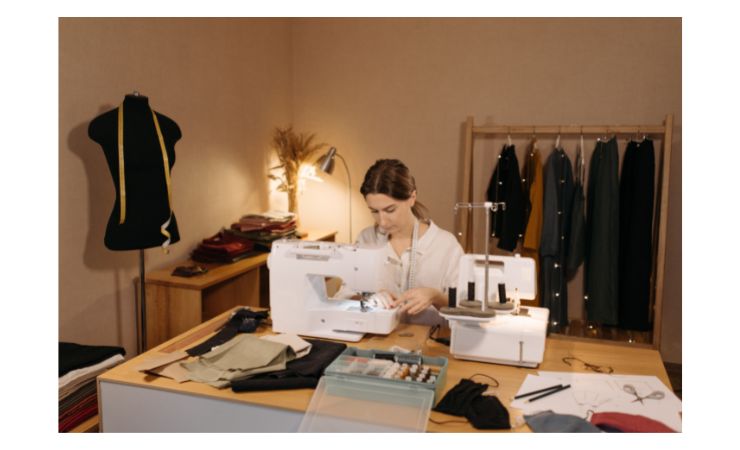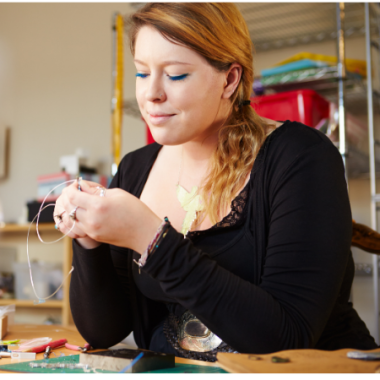Often started as a home business, Dressmakers or Seamstresses adjust and craft made-to-measure occasion wear such wedding and bridesmaids dresses, prom dresses, evening dresses or theatrical costumes.
It is common to alter garments by taking them in, letting them out, or shortening and lengthening their hems. Dressmakers can also offer a vintage clothing alteration service and many create custom dresses to a client’s design specifications.
This profile provides information about starting up and trading as a dressmaker. It describes the skills required, available training available, current market trends as well as details on sourcing materials and equipment. A full industry report is available with many Duport products.
Often dressmakers also provide clothing repair services; however, in this article we are not covering clothing alteration services.
Qualifications and skills
Although no legal qualifications are required to trade as a home business dressmaker, anyone starting up and running a dressmaking service will need advanced sewing skills along with experience and knowledge of pattern cutting and be familiar using various types of sewing machine.
A variety of courses are available to anyone wanting to improve or polish their dressmaking skills. Along with many free video tutorials on YouTube, examples of specialist courses include:
The London Academy of Dressmaking and Design give courses in draping, grading, beading and lace applique. Courses held in London are available via distance learning. See londonacademy
Jane White Tuition offers an online Fitting Sewing Patterns course. The £45 course covers taking accurate body measurements and understanding body shape differences. For more info see: janewhitetuition
PatternLab offers free online courses and guides to digital pattern creation. For courses details: patternlab
Some of the machine manufacturers offer training courses, including training on advance machine features. For example, Bernina: bernina courses. Singer: Singer courses
Current market issues and trends
A major customer group for dressmakers is brides who require custom-made wedding dresses and bridesmaids’ dresses or alterations to their gowns. According to the Wedding Industry Taskforce, more than 264,000 couples have postponed weddings planned for 2020. Meaning there are over 550,500 weddings in the ‘post-pandemic pipeline’ (https://ukweddings.org/key-facts).
There have been warning of delays at ports, which could see orders of dresses, veils and headwear fall behind schedule. The UK Alliance of Wedding Planners has advised brides to order a year in advance. These delays may result in an uptake in renting or buying a second-hand dress (femail/article-10149777).
Another key customer group for a home business dressmaker is school leavers who need alterations with prom dresses. The average spend on a prom dress being £250 this cost is a barrier to some families. Some dressmakers customise or alter cheaper prom dresses to enhance or individualise them. For UK based school prom information, see www.borngifted.co.uk/shop/resource/School-Prom-UK.
Dressmakers have seen opportunities in vintage clothing due to its continued popularity. Vintage clothing is not available in a full range of sizes, they often need adjustment. Online marketplaces such as eBay and specialist stores sell vintage clothing, driving and promoting the vintage trend.
Sourcing equipment and materials
The materials and equipment used by a home business dressmaker are sourced from reliable and reputable specialist trade suppliers.
A typical budget (including VAT) for equipment includes:
A sewing machine, which should be durable enough for professional use and provide stitch options that enable the user to perform complex sewing techniques (from around £100 for a basic machine up to £700 for a professional machine).
An overlocking machine, required for sewing certain fabrics and creating professionally finished seams and hems (from around £175 to £1,800).
Dressmaker’s dummy (from around £40 to £170).
Dressmaking scissors (from £5 to £30).
Garment rail (from £30 for a 5ft long rail).
Portable fabric steamer (from around £40 to £140).
Examples of equipment and pricing can be found at Sewing Machine Sales (www.sewingmachinesales.co.uk), Sew Essential (www.sewessential.co.uk) and AE Sewing Machines (www.ae-sewingmachines.co.uk).
Sourcing fabrics:
Litmans Fabrics (www.litmansfabrics.com).
The Lining Company (www.theliningcompany.co.uk).
Oddies Textiles (www.oddies-textiles.co.uk).
Hansson Silks (www.hansson-silks.co.uk).
Empee Silk Fabrics (https://wholesalefabrics.co.uk).
Visage Textiles (https://www.visagetextiles.com/
Specialist vintage fabric suppliers:
Donna Flower Vintage (www.donnaflowervintage.com).
Olive Road London (www.oliveroad.london).
The Vintage Sweetheart (www.vintagesweetheart.co.uk/wholesale)
Haberdashery supplies including buttons, ribbons, needles, beads, thread and other sewing accessories:
Taylors Supplies (www.taylorssupplies.co.uk).
Jay Trim (www.jay-trim.co.uk).
S.E. Simons (https://sesimons.co.uk).
Habico (www.habico.co.uk).
Jomil (https://jomil.co.uk).
Serendipity Ribbons (www.serendipityribbons.co.uk).
Bits & Bats (https://bitsandbats.com).
The Bead Shop (www.the-beadshop.co.uk).
Dress and costume patterns can be downloaded or ordered from online suppliers such as https://jaycotts.co.uk/pages/sewing-patterns and www.abakhan.co.uk/patterns.html.
Hopefully this guide to starting you dressmaking home business helps you begin your journey. Full industry reports, including trading, commercial and legal issues are available with the purchase of many of our products. If you’re not ready to start but would like to secure your name for future use check out our reserve company name product, this will include the industry report.
Just one more thing……. every month we give away the best business books, downloads and templates in our newsletters. Sign up below ⬇️







